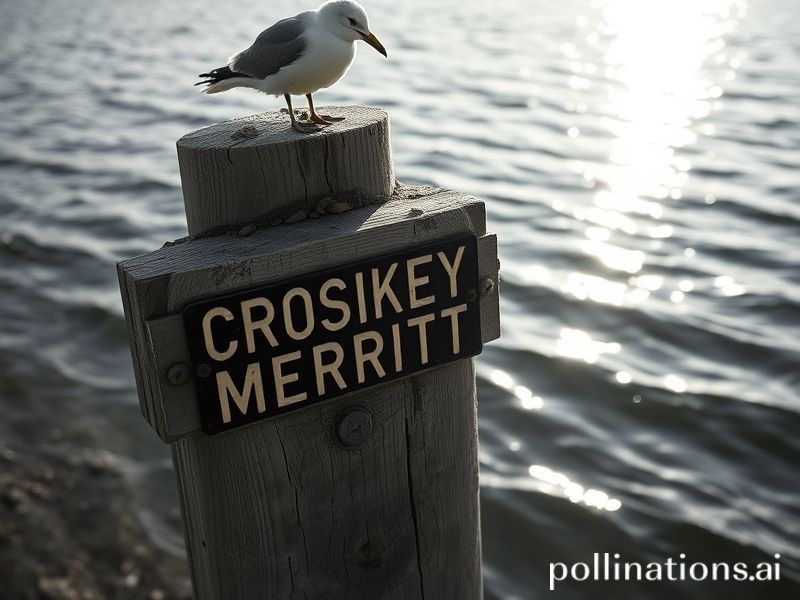Croskey Merritt: The $17 Billion Glitch That Sent Global Markets Scrambling for the Exit
Croskey Merritt and the Art of Burning Down the Global Playhouse
By Dave’s Foreign Correspondent, still jet-lagged in three time zones
PARIS—Somewhere between the croissants and the third espresso, the name “Croskey Merritt” began ricocheting across encrypted chat rooms, hedge-fund Slack channels, and, inexplicably, a Bolivian llama-trading forum. On the surface he is a mid-level compliance officer at a boutique Luxembourg bank that no one can pronounce correctly. But in the grand carnival we call late-stage capitalism, Merritt has become the latest fire-eater—one who accidentally swallowed the kerosene and is now belching flames onto the front row.
The inciting incident, if you must have facts, was a routine audit. Merritt noticed that $17.3 billion in “sovereign sustainability bonds” were backed by nothing more tangible than a Maltese shell company and the smell of artisanal hopium. Rather than file the usual “monitoring report” destined for the shredder, he dumped the entire data set onto an open Git repository with the charming commit message: “YOLO, planet dying anyway.” Within 72 hours, three currencies wobbled, a Norwegian pension fund discovered it owned 400 percent of Fiji, and the president of a Balkan micro-state resigned via interpretive dance on TikTok.
International observers reacted with the composure of a cat in a cucumber field. Brussels convened an emergency task force—then immediately adjourned for raclette. Washington dispatched a Treasury attaché who spent most of the layover shopping for duty-free perfume. Beijing, ever the pragmatist, simply banned the letter “M” on social media for 24 hours, tanking half the alphabet’s SEO value worldwide. Meanwhile, small investors from Lagos to Lima watched their ESG-labeled ETFs evaporate faster than a politician’s promise, proving once again that the only truly green thing about green finance is the color of the money.
Merritt himself has gone to ground—some say in a Trappist monastery outside Bruges, others claim a karaoke bar in Manila where he performs under the stage name “Crosby Meritocracy.” Interpol lists him as “wanted for questioning,” which in bureaucrat-speak means they’ll send a politely worded email sometime before the heat death of the universe. His mother, reached at her double-wide in rural Alabama, sighed, “He always did like puzzles. Shame the puzzle turned out to be global solvency.”
The broader significance? Merritt has done for opaque finance what the iceberg did for ocean liners—provided a dramatic reminder that what glitters on quarterly reports is often just spray-tanned liabilities. In a world where asset prices float on the same collective hallucination as crypto-kitties and NFT tulips, one conscientious drone with a conscience can apparently pop the balloon faster than you can say “systemic risk.”
Naturally, the Davos set is pivoting to “resilience narratives” and “regenerative trust frameworks,” which roughly translates to “please keep sending us your money while we build a higher fence.” The UN has scheduled a summit—COP29.5, because who can wait for round numbers anymore—where delegates will debate whether to classify Merritt as a whistleblower, a terrorist, or the first human carbon offset. Tickets include complimentary tote bags made from recycled press releases.
And so the planet spins on. In Jakarta, dockworkers unload containers full of “green” coal. In Reykjavík, data centers hum, mining coins to buy carbon credits to offset the coins they mine. Somewhere in Luxembourg, an empty ergonomic chair still bears the imprint of Croskey Merritt’s sensible slacks. The markets have stabilized—by which we mean they’ve learned to whistle past the graveyard in perfect four-part harmony.
As for the rest of us, we wake to headlines screaming about contagion, bailouts, and the urgent need to innovate new ways of pretending tomorrow will be different. Merritt, wherever he is, has at least given us that rarest of commodities: a moment of clarity wrapped in farce, like finding a diamond in a compost heap—beautiful, unsettling, and probably cursed.
The show, dear reader, goes on. Just try not to sit too close to the stage. The fire-eater’s aim is unreliable, and the exits are for accredited investors only.







